Nobody cares about your content. And no one will, if you don’t give them a reason to.
To be a pro writer, you must craft addictive copies that keep readers hypnotized, line by line.
As a content writer (who’s been writing everyday for the last 6-7 years), I thought it’s better to share some advanced content writing hacks for beginners for 2025 and beyond to produce compelling pieces.
I have learned these hacks from my personal experience and I hope you’ll like them too.
Let us cut to the chase.
1. Use AI as a Stepping Stone
AI isn’t a good substitute for your creativity.
Be it ChatGPT, Gemini, or any other popular tool, they all follow a set writing pattern, style, vocabulary, and tone. For instance, try writing a conclusion with a generative AI tool. You’ll notice a similar pattern repeating in each output –
ChatGPT
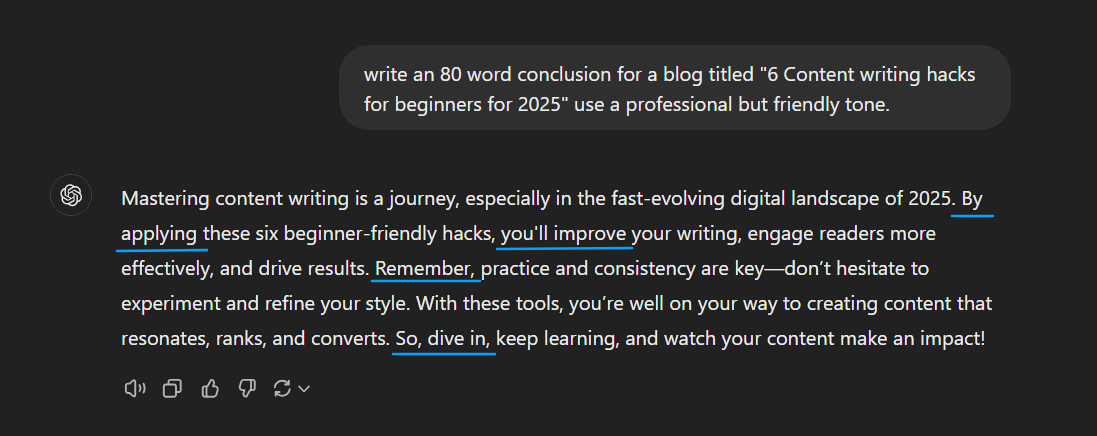
Gemini
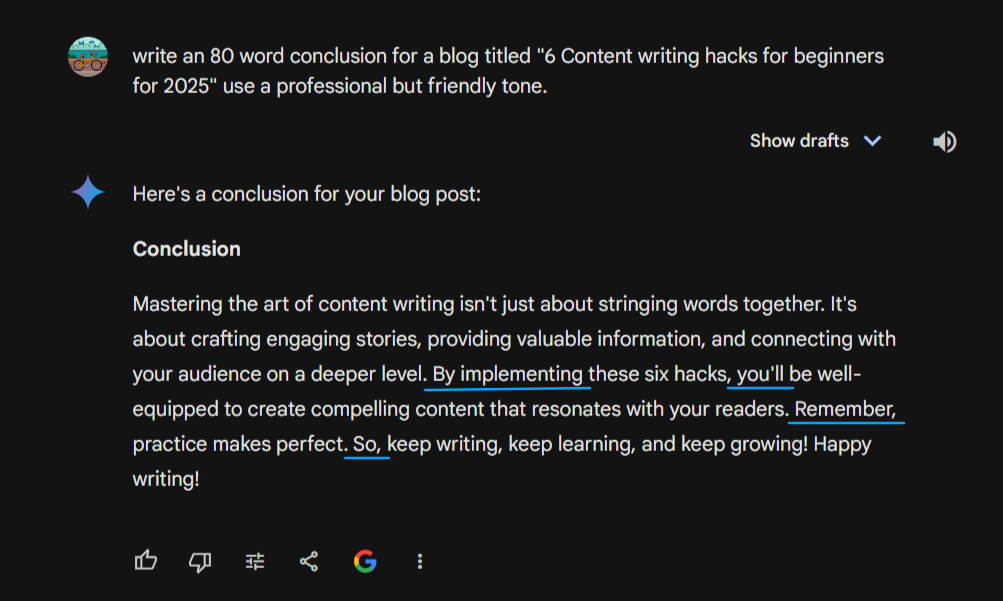
You.com
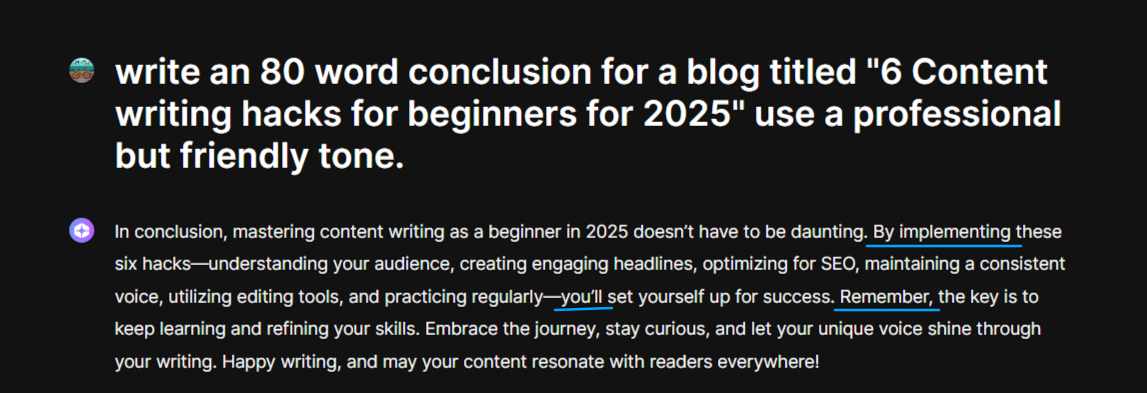
See how all of them use the similar pattern and words like “By,” “you’ll,” “So,” and “Remember.”
But being a creative human, you may not use the same pattern every time to finish your content. I mean, just look at the conclusion of this post only. You’ll notice the difference in the approach of a human and AI for a specific content.
Now you can debate about training and giving the tool more instruction. And, that does work. But based on your new instructions, these tools will create new patterns and start following them.
The point I’m trying to make is – AI is good, but can’t match your creativity. However, you must know when and how to use it.
Here are some (ethical) uses of AI for writers:
- Proofreading and improving your written piece
- Suggesting topic ideas when nothing’s coming to your mind
- Finding keywords for the topic you’re writing
- Gathering facts and data on a super-narrow subject with limited info on the Internet
Using AI (especially by writers) is shown as if it is a crime. But it’s actually not, if you aren’t relying on AI-generated copy verbatim.
In fact, bloggers using AI save 30% of their time writing a blog post. You can also get these benefits. Just use AI for good; don’t depend on it.
2. Never Leave Your Actual Style
When you start your content writing journey, you have a unique style.
Some like writing in a casual style with an informal tone while others prefer being professional and formal while penning their words. But with time, you receive edits and feedback. These edits make you change your original style so you can avoid those repetitive feedback and create a flawless copy in one go.
So the first content writing tip is – always stick to your original style.
And that’s probably the best content writing hacks for beginners.
If you work as a freelancer or write for your own brand, sustaining your actual style is easy. But if you start working for a brand, you may need to tweak your style a bit.
But tweaking your style doesn’t mean you should disguise your casual writing with a super-formal tone. You can be adaptive with the required writing tone while sprinkling your original style of elements in your copy.
It’s all about being flexible.
3. Edit Ruthlessly
Editing makes good content great.
Statistically speaking, 30% of bloggers have a formal editing process and they are 50% more likely to see better results.
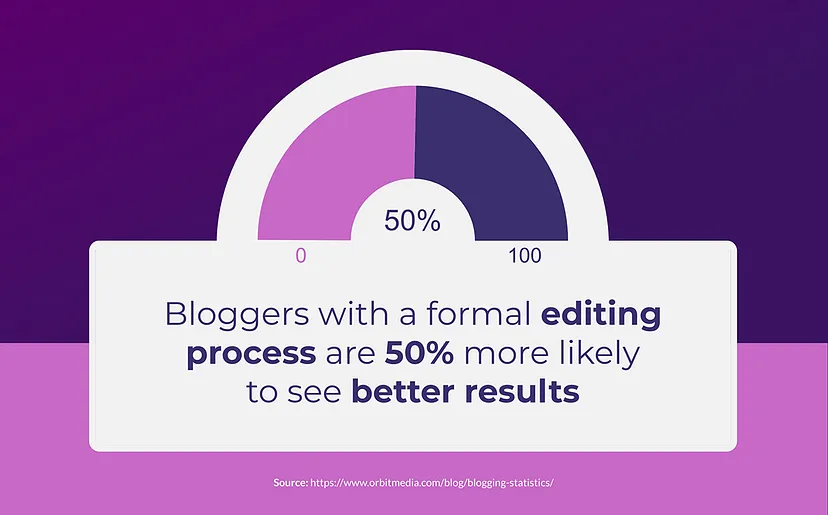
Thus, after finishing your content, you need to edit it to weed out the unnecessary elements and make it a flawless copy. And be ruthless while editing.
If you are responsible for editing your content, you should always be ready to change anything that can hinder the reader’s experience. So, if you have written something you really wanted to write about, but it doesn’t fit with your content, cut it.
Just look at how I chopped up some unnecessary elements in this blog that didn’t make sense to me:
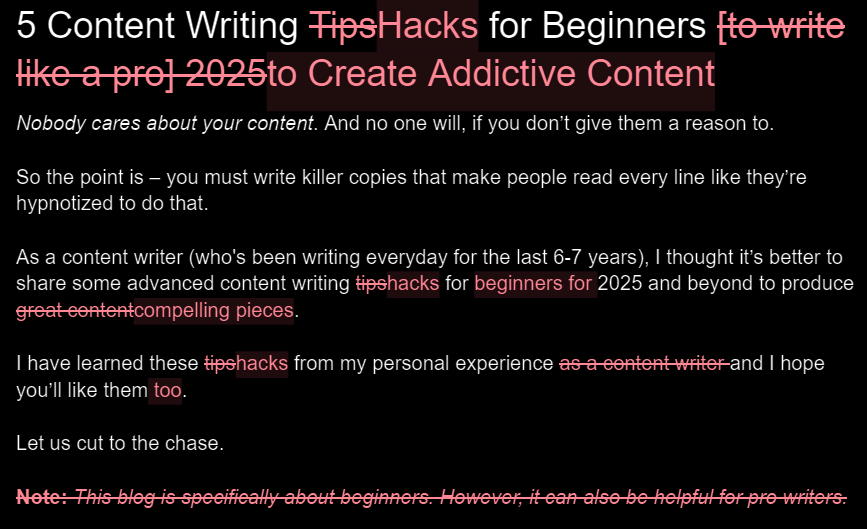

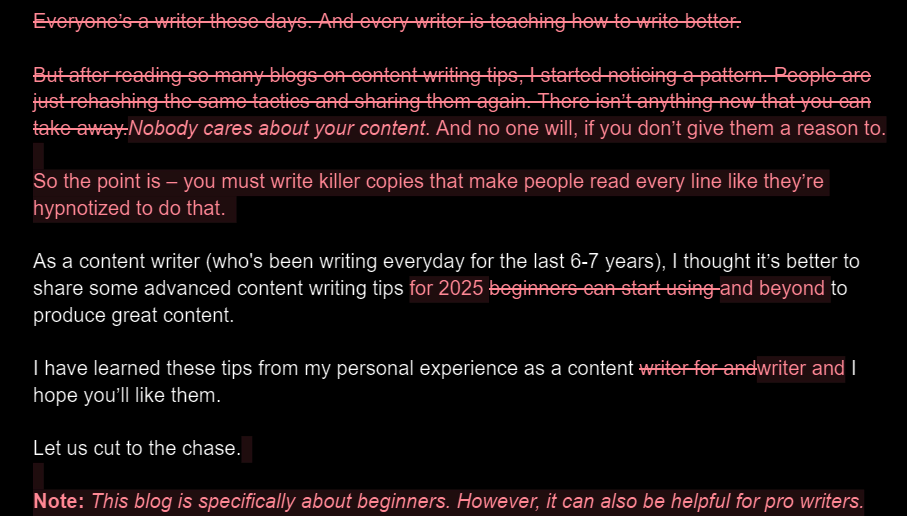
Even a small sentence can turn readers off and you are writing for the audience. So there shouldn’t be any bullsh*t that makes them close the tab. That’s a well-known trick but also one of the key content writing hacks for beginners to produce an addictive content piece.
A pro tip: If others have the authority to suggest edits, you don’t need to accept them blindly. Look at the suggestions and if they are not a good fit, reject them and tell them why you did that.
4. Fancy Words ≠ Intelligent Writing

That’s a common content writing mistake I too made in my early days of writing.
I thought jargon would make me and my content look smarter. But that’s not the case. Using jargon would complicate your content for the readers. And you don’t want your readers to read a line twice or thrice to understand it.
For example, look at these two sentences:
Composing narrower phrases is an excellent approach to captivate readers.
Writing shorter sentences is a great way to engage readers.
Which one of these is more straightforward or makes better sense? The second one, right? And that’s the idea.
Simple content is memorable content. Jargons only complicate it. So instead of using these fancy words, use simple terms even a toddler can understand.
5. Understand the Intent Before Writing
One of my key content writing hacks for beginners is mastering the search intent.
A major mistake writers make in the beginning is – not knowing the intent of the content. Let’s quickly understand what intent is.
A search intent is simply the objective of the reader behind searching a content.
There are 4 different types of search intent:
- Informational: The objective is to get more knowledge on the topic. For example, “what is generative AI?”
- Navigational: The objective is to find a specific product, service, etc. For example, “Rankmath SEO plugin.”
- Transactional: The objective is to purchase something. For ex, “iPhone 16 pro”
- Commercial: The objective is to look for a curated collection of products or services. For example, “best camping tents.”
Studies found that 80% of the queries have informational intent while the rest split into transactional and navigational.
So be clear about intent prior writing.
If you are creating a blog post on “content writing hacks for beginners,” you won’t talk about creating topic cluster, avoiding keyword cannibalization, etc. because that’s some pro level sh*t.
For this topic, you will talk about basic things as the blog targets beginners. You can search the keyword on Google, analyze the results, see what others have covered.
Then you can start writing.
Do not unnecessarily fit something in your content that does not belong there. Your content should be straightforward and doesn’t beat around the bush.
6. Stop Stressing on the Nitty Gritty
There are some common writing practices popular among the writers like,
- Avoiding passive voice
- Writing Search Engine friendly content
- Writing comprehensive and lengthy posts with 2000+ words
- Avoiding adjectives and adverbs
Though these trivial rules are important, they aren’t supposed to be followed religiously.
What matters the most is how your reader perceives your content. And everything’s good if your readers love your post.
But how do you figure out if your readers will be impressed?
Well, for published content, the only way is to analyze your content’s performance. Use tools like Google Analytics, Google Search Console, etc.
Look at engagement metrics like page on time, bounce rate, scroll depth, and more.
For unpublished content, the best way is to read your content aloud.
This would tell you if your content were actually engaging or you’re the only fan of your writing piece. If possible, ask someone with a good content taste to read your content.
Coming to an End…
If you skimmed the whole post and landed to the conclusion directly, here are some key takeaways for you,
- Never lose your original writing style, but be flexible also.
- Edit your content like your competitor has written it.
- Avoid jargon in your writing. It makes your content complex.
- Be straightforward and avoid bullshi’ing.
- Don’t follow the writing thumb rules blindly.
But still the bottom line would always be, “Always be ready to adapt different content writing styles.” Because obviously, you can’t write in the same style for a club and a rehab.
The content writing domain is evolving so fast, it’s hard to catch up. If you want to keep producing amazing content and compel your readers to read, follow those shared content writing hacks.
Wanna share some content writing hacks that helped you improve? The comment section is all yours. Let’s discuss.
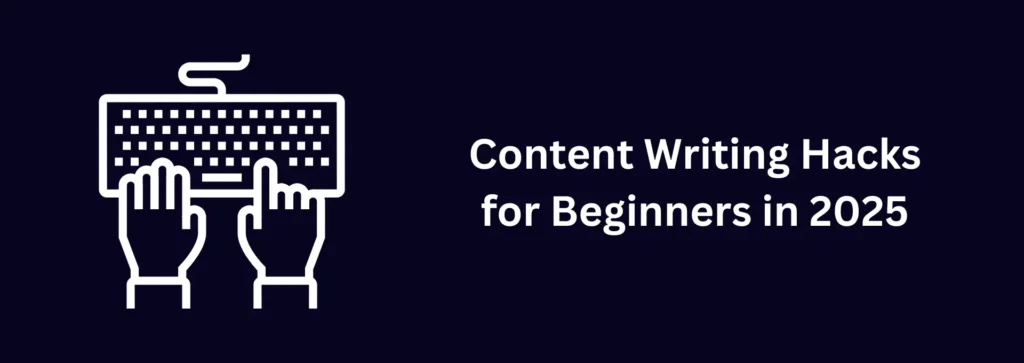
Great insights in your blog! The tips are simple yet powerful for anyone looking to improve their writing game. Focusing on clarity, structure, and audience engagement can truly transform basic content into something captivating.
Thanks. Glad you liked the content 🙂